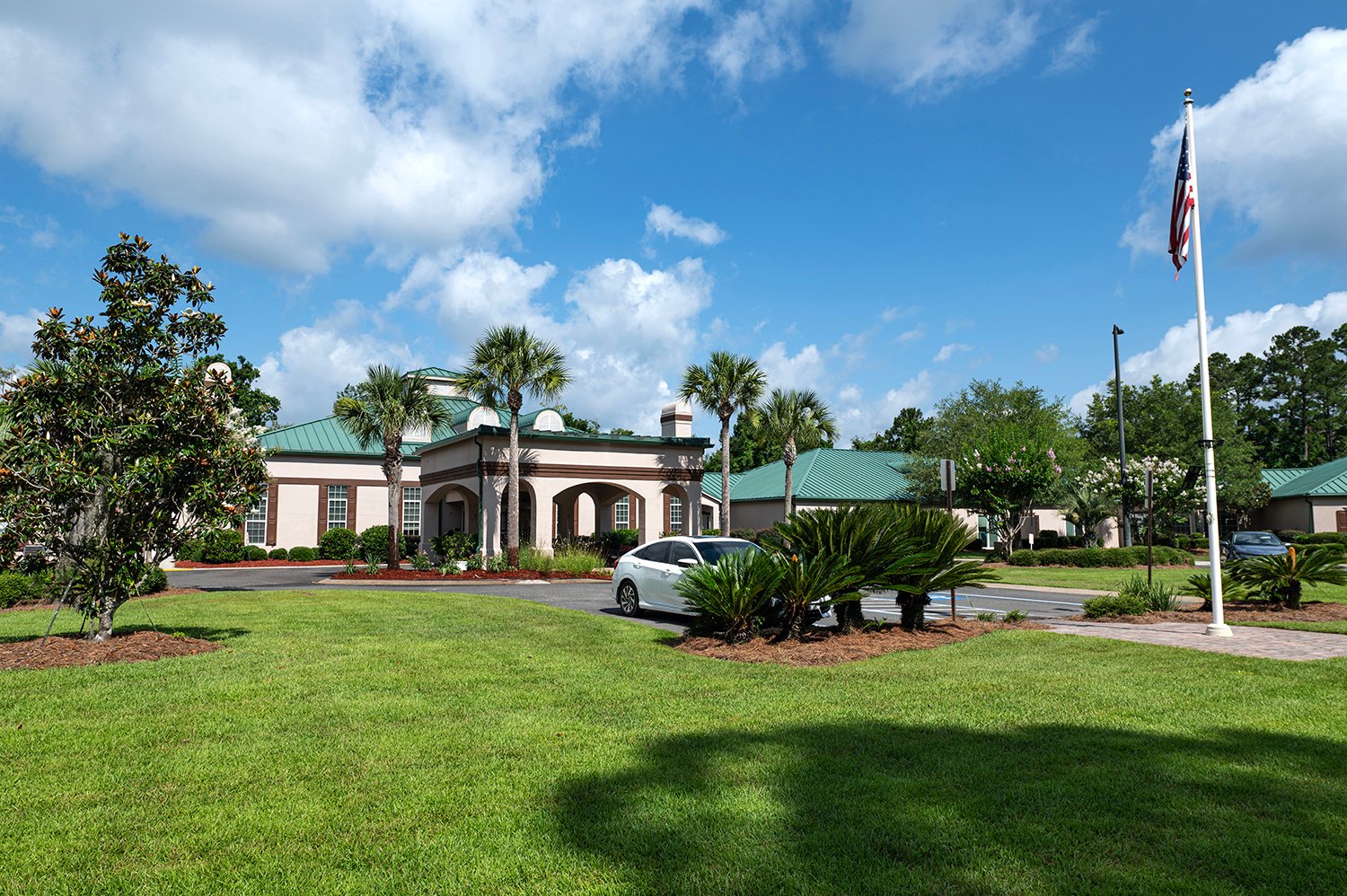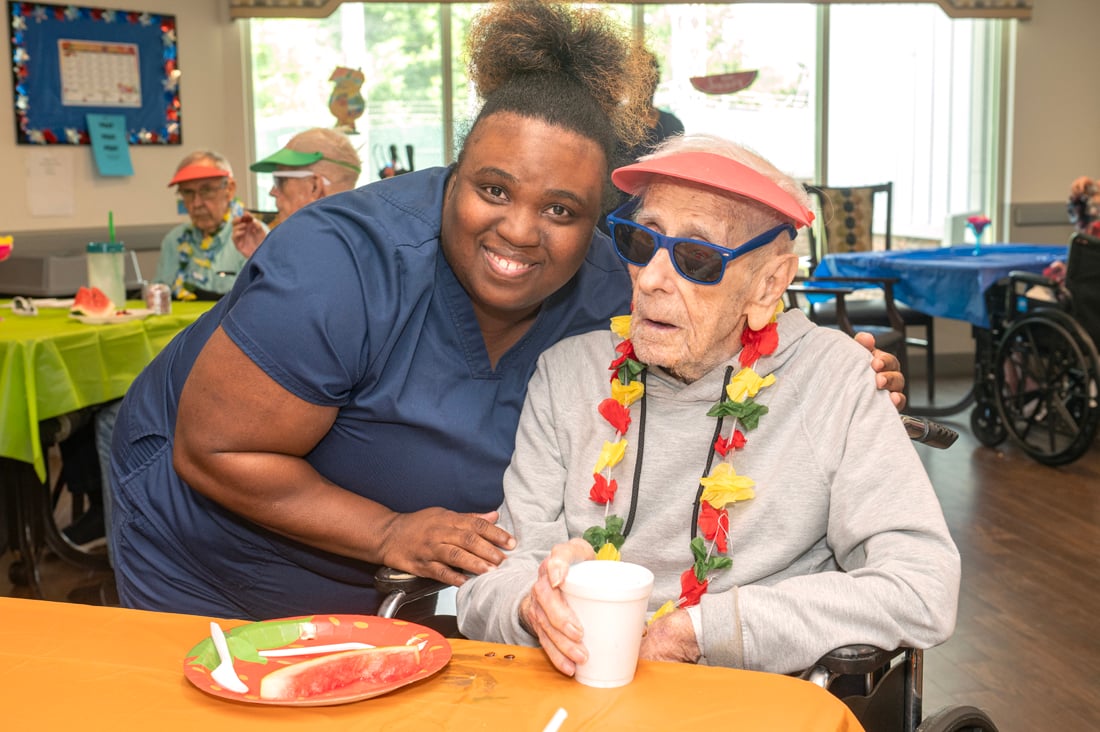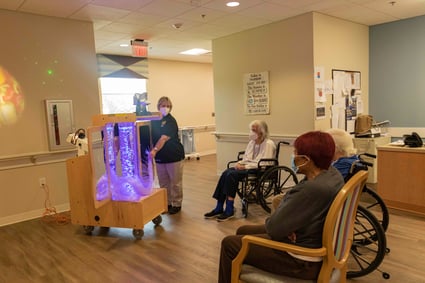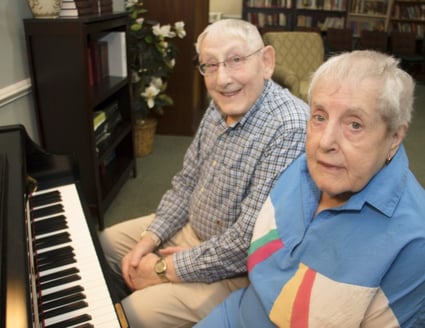Download our Free Guide:
Senior Living Explained
Learn what different types of senior living care are available and which one best fits your needs now and in the future.


%20.jpg?width=720&height=480&name=Mattie%20H.%20Marshall%202025%20NALW%20Paris%20Trip%20(920)%20.jpg)
Alzheimer’s has become a household word around the world for the unfortunate reason that this and other forms of dementia are on the rise as populations age. This issue is so important that multiple months here in the US are designated as times to heighten Alzheimer’s awareness. November is one of them.
The good news is that research into the causes of dementia and potential treatment options has increased substantially in recent years. The advocacy group Alzheimer’s Impact Movement reports that unprecedented funding now allows scientists “to work at a more rapid pace to advance basic disease knowledge, explore ways to reduce risk, uncover new biomarkers for early diagnosis and drug targeting, and develop potential treatments.”
Promising Results
Research is uncovering breakthroughs on several fronts. For example, ScienceDaily reports these recent headlines, which have also been widely reported in the news.
%20.jpg?width=425&height=283&name=Mattie%20H.%20Marshall%202025%20NALW%20African%20Safari%20(816)%20.jpg) September 4: “Scientists at the University of Bath [UK] have developed a simple three-minute brainwave test called Fastball EEG that can detect memory problems years before Alzheimer’s is typically diagnosed. With breakthrough Alzheimer’s drugs working best in early stages, this low-cost, accessible tool could transform early detection and treatment.”
September 4: “Scientists at the University of Bath [UK] have developed a simple three-minute brainwave test called Fastball EEG that can detect memory problems years before Alzheimer’s is typically diagnosed. With breakthrough Alzheimer’s drugs working best in early stages, this low-cost, accessible tool could transform early detection and treatment.” September 14: “Chronic insomnia may do more than leave you groggy; it could speed up brain aging. A large Mayo Clinic study found that people with long-term sleep troubles were 40% more likely to develop dementia or cognitive impairment, with brain scans showing changes linked to Alzheimer’s.”
September 14: “Chronic insomnia may do more than leave you groggy; it could speed up brain aging. A large Mayo Clinic study found that people with long-term sleep troubles were 40% more likely to develop dementia or cognitive impairment, with brain scans showing changes linked to Alzheimer’s.” September 28: “Researchers in Japan discovered that Parkinson’s patients diagnosed in their 80s are far more likely to show signs of amyloid buildup, a hallmark of Alzheimer’s, even without dementia symptoms . . . suggesting that Parkinson’s might change the way Alzheimer’s-related processes unfold in the brain.”
September 28: “Researchers in Japan discovered that Parkinson’s patients diagnosed in their 80s are far more likely to show signs of amyloid buildup, a hallmark of Alzheimer’s, even without dementia symptoms . . . suggesting that Parkinson’s might change the way Alzheimer’s-related processes unfold in the brain.”.jpg?width=425&height=283&name=Mattie%20H.%20Marshall%20Resident%20%26%20Staff_LR%20(9906).jpg) There is much more, but the point is obvious – great strides are being made. Meanwhile, when it comes to improving the daily lives of those with Alzheimer’s and other forms of dementia, memory care senior living is playing a vital role for individuals and families. Here at Magnolia Manor, we have seen an increasing need for memory care, and we have responded accordingly using techniques developed as a result of recent research.
There is much more, but the point is obvious – great strides are being made. Meanwhile, when it comes to improving the daily lives of those with Alzheimer’s and other forms of dementia, memory care senior living is playing a vital role for individuals and families. Here at Magnolia Manor, we have seen an increasing need for memory care, and we have responded accordingly using techniques developed as a result of recent research.
Memory Care at Magnolia Manor
We offer memory care at three of our campuses:
 Our Mattie H. Marshall Memory Care Center, located on the Americus campus, is a state-of-the-art facility designed specifically for dementia care residents. Each room features a memory care shadow box display that helps residents remember where their rooms are located. The boxes contain personal items such as pictures, family relics, and so on that are dear to the resident.
Our Mattie H. Marshall Memory Care Center, located on the Americus campus, is a state-of-the-art facility designed specifically for dementia care residents. Each room features a memory care shadow box display that helps residents remember where their rooms are located. The boxes contain personal items such as pictures, family relics, and so on that are dear to the resident.
In common areas, halls are bright with a handrail on the wall to help guide residents. Spaces are open with high ceilings to create a welcoming, inviting environment. And lighting is designed to help ease residents who may experience sundowning syndrome.
%20.jpg?width=425&height=283&name=Americus%20NC%20Garden%20Project%20(1727)%20.jpg) Our memory care communities have code-accessed, enclosed courtyards where residents can enjoy the outdoors safely. Amenities include sitting areas, bird feeders, and some even have raised garden beds where residents can participate in gardening activities.
Our memory care communities have code-accessed, enclosed courtyards where residents can enjoy the outdoors safely. Amenities include sitting areas, bird feeders, and some even have raised garden beds where residents can participate in gardening activities.
Several of our campuses feature portable or stationary in-room Snoezelen sensory machines that use lights, touch, and sound to both soothe and entertain residents.
Scheduled daily activities encompass physical, mental, and spiritual care. Residents enjoy worship services, musical performances from volunteers, visits from various local groups, exercise programs such as Tai Chi with Jeni, and more. But the animal therapy sessions are especially popular.
Putting These Practices to Work at Home
 Many of the protocols and techniques we use at Magnolia Manor to support our memory care residents can be duplicated or modified for at-home care. Especially during the upcoming holidays, when out-of-town guests may be visiting (or you may be visiting a loved one with dementia), the experience can be more rewarding and less stressful for everyone if you take advantage of these tips for caring and coping.
Many of the protocols and techniques we use at Magnolia Manor to support our memory care residents can be duplicated or modified for at-home care. Especially during the upcoming holidays, when out-of-town guests may be visiting (or you may be visiting a loved one with dementia), the experience can be more rewarding and less stressful for everyone if you take advantage of these tips for caring and coping.
As research continues to expand our understanding of Alzheimer’s, our ability to treat the disease and improve the daily lives of seniors living with memory challenges will also continue to improve.
Come See For Yourself
Schedule a tour at one of our three Memory Care communities to see for yourself how you can have peace of mind knowing your loved one with Alzheimer’s is in good hands. For questions about memory care contact us at 1-855-540-LIFE.
Learn what different types of senior living care are available and which one best fits your needs now and in the future.
